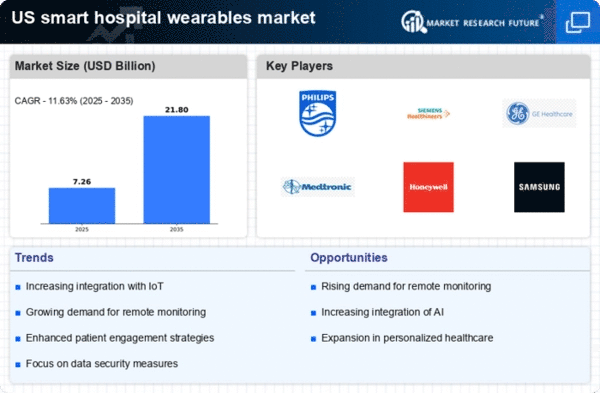Integration with Telehealth Services
The smart hospital-wearables market is increasingly intertwined with the expansion of telehealth services. As healthcare providers adopt telehealth solutions, the need for remote patient monitoring becomes paramount. Wearable devices facilitate this by providing continuous health data that can be shared with healthcare professionals during virtual consultations. This integration enhances the quality of care, as providers can make informed decisions based on real-time data. The telehealth market is expected to reach $250 billion by 2025, indicating a strong correlation with the growth of the smart hospital-wearables market. As telehealth continues to gain traction, the demand for wearables that seamlessly integrate with these services is likely to rise, further propelling market growth.
Increased Focus on Preventive Healthcare
The smart hospital-wearables market is benefiting from an increased focus on preventive healthcare. As healthcare systems shift from reactive to proactive approaches, wearables play a crucial role in early detection and prevention of health issues. By continuously monitoring vital signs and other health metrics, these devices can alert users and healthcare providers to potential problems before they escalate. This proactive approach not only improves patient outcomes but also reduces healthcare costs, as early intervention is often less expensive than treating advanced conditions. The market is projected to grow at a CAGR of 25% over the next five years, driven by this emphasis on prevention. As more healthcare organizations recognize the value of wearables in preventive care, the smart hospital-wearables market is likely to see significant growth.
Regulatory Support and Reimbursement Policies
The smart hospital-wearables market is positively impacted by regulatory support and evolving reimbursement policies. Government agencies are increasingly recognizing the value of wearable technology in healthcare, leading to the establishment of guidelines that promote their use. Additionally, insurance companies are beginning to offer reimbursement for wearable devices, making them more accessible to patients. This shift is crucial, as it encourages healthcare providers to adopt wearables as part of their standard practice. With an estimated 30% of healthcare costs being attributed to chronic diseases, the potential for wearables to mitigate these costs is significant. As regulatory frameworks continue to evolve, the smart hospital-wearables market is likely to experience accelerated growth.
Technological Advancements in Wearable Devices
The smart hospital-wearables market is experiencing growth due to rapid technological advancements in wearable devices. Innovations in sensor technology, miniaturization, and battery life enhancement are enabling the development of more sophisticated wearables. These devices can now monitor vital signs such as heart rate, blood pressure, and oxygen saturation with remarkable accuracy. According to recent data, the market for wearable medical devices is projected to reach $27 billion by 2026, indicating a robust growth trajectory. This growth is driven by the increasing demand for real-time health monitoring and the ability to provide immediate feedback to healthcare providers. As technology continues to evolve, the smart hospital-wearables market is likely to expand further, offering new functionalities and improved patient outcomes.
Rising Demand for Personalized Healthcare Solutions
The smart hospital-wearables market is significantly influenced by the rising demand for personalized healthcare solutions. Patients are increasingly seeking tailored health management options that cater to their individual needs. Wearable devices facilitate this by providing real-time data that can be analyzed to create personalized health plans. This trend is supported by a growing awareness of chronic diseases, which affects approximately 60% of adults in the US. As healthcare providers adopt wearables to monitor patients more effectively, the market is expected to grow substantially. The integration of artificial intelligence in wearables further enhances personalization, allowing for predictive analytics that can foresee potential health issues. Consequently, the smart hospital-wearables market is poised for continued expansion as it aligns with the shift towards patient-centered care.























Leave a Comment